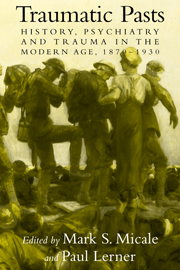Book contents
- Frontmatter
- Contents
- Contributors
- Preface
- 1 Trauma, Psychiatry, and History: A Conceptual and Historiographical Introduction
- Part One Travel and Trauma in the Victorian Era
- Part Two Work, Accidents, and Trauma in the Early Welfare State
- Part Three Theorizing Trauma: Psychiatry and Modernity at the Turn of the Century
- Part Four Shock, Trauma, and Psychiatry in the First World War
- 9 “Why Are They Not Cured?” British Shellshock Treatment During the Great War
- 10 Psychiatrists, Soldiers, and Officers in Italy During the Great War
- 11 A Battle of Nerves: Hysteria and Its Treatments in France During World War I
- 12 Invisible Wounds: The American Legion, Shell-Shocked Veterans, and American Society, 1919–1924
- Index
- Titles in the series
9 - “Why Are They Not Cured?” British Shellshock Treatment During the Great War
Published online by Cambridge University Press: 14 October 2009
- Frontmatter
- Contents
- Contributors
- Preface
- 1 Trauma, Psychiatry, and History: A Conceptual and Historiographical Introduction
- Part One Travel and Trauma in the Victorian Era
- Part Two Work, Accidents, and Trauma in the Early Welfare State
- Part Three Theorizing Trauma: Psychiatry and Modernity at the Turn of the Century
- Part Four Shock, Trauma, and Psychiatry in the First World War
- 9 “Why Are They Not Cured?” British Shellshock Treatment During the Great War
- 10 Psychiatrists, Soldiers, and Officers in Italy During the Great War
- 11 A Battle of Nerves: Hysteria and Its Treatments in France During World War I
- 12 Invisible Wounds: The American Legion, Shell-Shocked Veterans, and American Society, 1919–1924
- Index
- Titles in the series
Summary
The current interest in the psychiatric disorders of the Great War dates back to three innovative and very different studies of the 1970s: The Great War and Modern Memory by Paul Fussell, The Face of Battle by John Keegan, and Eric Leed's study of combat and identity No Man's Land. The focus of these studies was the personal experience of war, especially but not exclusively the Great War; the assumptions and understanding brought to it and, often, the damage and loss that result. A second group of studies emerged in the middle and late 1980s, including more specialized works on psychological medicine, feminist interpretation, as well as two extended pieces of research on the British experience. Snowball-like, the chapters presented in the final sections of Traumatic Pasts illustrate the development of comparative and postwar studies, although other issues, such as the experience of war neurotic ex-servicemen and the much wider theme of Great War psychological trauma as a pathology of modernity, are open to further exploration.
The Great War and the British soldiers' experience of that war were the starting point for these developments, the studies of the 1970s particularly helped establish a framework within which more recent debates have taken place, and for that reason I want to review the British experience.
- Type
- Chapter
- Information
- Traumatic PastsHistory, Psychiatry, and Trauma in the Modern Age, 1870–1930, pp. 205 - 221Publisher: Cambridge University PressPrint publication year: 2001
- 14
- Cited by

